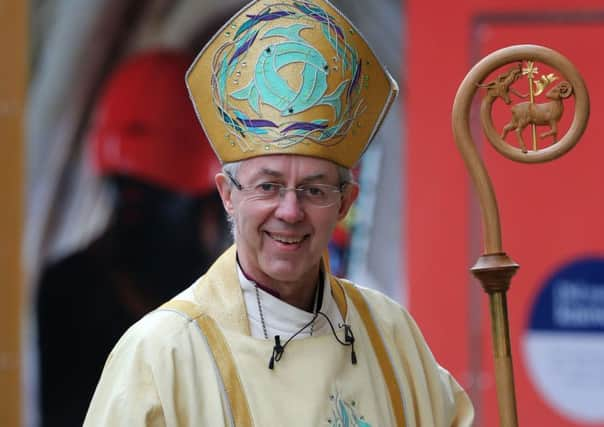Ryan Shorthouse: The Church and politics. Religion should inspire us but it's no substitute for government


This followed his involvement in and endorsement of a major economic report by centre-left think-tank IPPR, which called for significant increases in both taxation and spending.
Despite historically low Church attendance, the Church of England, and Justin Welby in particular, still have considerable popularity and authority in this country. The Archbishop’s speech was followed by an article for The Yorkshire Post by Dr John Sentamu, the Archbishop of York, urging Ministers to think again over the implementation of Universal Credit.
Advertisement
Hide AdAdvertisement
Hide Ad

They should, in my view, use that power to influence public debate and policy towards the ‘common good’.
But just as the Archbishop of Canterbury should speak out on political matters, he should also expect – and engage with – critics of his views. On the gig economy, for instance, the evidence shows us that the experience of those working in it is much more mixed than the hellishness he describes.
Undoubtedly there are those who are being exploited, but previous Bright Blue research illustrates that the majority of self-employed individuals living in low-income households have high job satisfaction, certainly more than employees.
Advertisement
Hide AdAdvertisement
Hide AdReligion, I think, is at its most useful when it encourages reflectiveness, of ourselves and the world around us, rather than absolutist and judgmental thinking, which Mr Welby has, unfortunately, been guilty of here.
The controversy over these comments ultimately proved that when the Archbishop speaks, we still very much listen – even agnostics like me. This is because the Church has had a long and unique place in this country’s fabric since the Elizabethan period: present, yes – in educational, community, cultural and public life – but never omnipresent.
As the esteemed conservative philosopher, Sir Roger Scruton, tells Bright Blue in his interview with us for our latest magazine, the English continue to have a strong affinity with Christian values, but struggle with the metaphysics of it all and certainly don’t want its teachings thrust down their throats. He argues, astutely, that the English “are guilty of all kinds of eccentric qualities that come to them from the Christian faith, even though they are not in the business of affirming that faith”.
Advertisement
Hide AdAdvertisement
Hide AdThere is, it seems, a liberalness to Anglicanism: most people do not live and breathe it, but instead forever dip in and out of Anglican institutions and ideas. It is discursive about and welcoming of different faiths in its schools and churches. Indeed, Christianity heavily shaped the canon of liberal thinking that so influenced European and American politics from the Enlightenment, despite the fashionable assumption that Christianity and liberalism have been from the start in conflict.
Religious thinking should – and does – have a place in liberal society then. And we need not follow in the footsteps of the French, consigning faith to the private realm alone. Secularism, specifically secular law, is essential to transcending especially religious and ethnic differences to build functioning, stable nation-states. But we need not be doctrinaire about secularism, prohibiting religious thinking, symbols and representation in the public realm.
This brings us to the wearing of the veil. Across many European countries, despite so few women wearing it, the veil has become a point of major political debate, raising questions about gender, religion and public safety in modern society. I do not think we should follow the French, who in 2010 banned the concealment of the face with items such as masks, helmets, balaclavas and, yes, veils.
Advertisement
Hide AdAdvertisement
Hide AdThe truth is that we cannot be certain just how much of any religiously-motivated action or thought, in fact any type of action or thought, derives from free will or external pressure. As long as it is not harmful to others, then, it strikes me that wearing the veil should be permitted, apart from in exceptional circumstances. But of course, it should be a part of robust but civil debate, as should other non-harmful but contentious religious practices.
Faith has played and does play, generally, a positive role in society, the motivation for good words and works by many. But, as history warns, it can also be deeply destructive, particularly if people use it as an ideology to impose their will or worse on others. Religion can and should inspire, both in public and in private, but it must not govern. The Church of England should therefore continue to campaign for the ‘common good’ in this country, but carefully.
Ryan Shorthouse is the founder and director of the Conservative think-tank Bright Blue. This is an edited extract from Bright Blue’s magazine Centre Write, the latest edition of which is entitled ‘Staying faithful?’